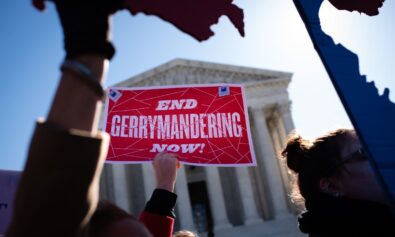#BlackLivesMatter is growing in influence, now grabbing the attention of progressive funders who are giving serious thought to bankrolling the diffuse network of Black-led organizations dedicated to criminal justice reform and ending violence against Black people. It makes one wonder what happens next, what happens to the autonomy of this new movement, and if #BlackLivesMatter is destined to become the next NAACP.
As Kenneth P. Vogel and Sarah Wheaton report in Politico, the Democratic Alliance is meeting from Tuesday until Saturday of this coming week in Washington to discuss funding the protest movement. The DA, as it is known in Democratic Party circles, is a secretive club of wealthy, left-leaning donors, a liberal answer to the Koch Brothers. Created in 2005 by George Soros, Taco Bell heir Rob McKay and a handful of donors, DA requires that its members donate at least $200,000 each year to certain organizations in order to promote progressive causes. DA funds a wide array of social justice and civil rights groups that are making a difference, part of an effort to create a progressive infrastructure. Combined funding now totals over $500 million. Now, it is recommending that its members write checks to groups supporting the movement.
However, as Politico indicates, there are possible risks and pitfalls associated with such a move. For example, funding an inherently confrontational Black movement meant to bring discomfort and shake the status quo will test the limits of some of these donors.
More importantly, there is a risk that grassroots groups will lose their edge, their autonomy and control over their mission, their operations and their destiny. The book, The Revolution Will Not Be Funded: Beyond the Non-Profit Industrial Complex, edited by Incite! Women of Color Against Violence, makes the point that since the late 1970s, social justice organizations have availed themselves of 501(c)(3) nonprofit status.
“Despite the legacy of grassroots, mass-movement building we have inherited from the 1960s and 70s, contemporary activists often experience difficulty developing, or even imagining, structures for organizing outside this model,” the book says.
The editors are concerned about the ways in which capitalist interests “monitor and control social justice movements,” “redirect activist energies into career-based modes of organizing instead of mass-based organizing capable of actually transforming society, allow corporations to mask their exploitative and colonial work practices through ‘’philanthropic’ work” and “encourage social movements to model themselves after capitalist structures rather than to challenge them.”
On the one hand, social justice organizations need funding. And when funding sources have dried up in a weak economy, it is necessary to consider and to locate new sources of revenue. But a nonprofit must read the fine print and determine whether there are strings attached. When someone hands you the money, they expect something in return. This could require a group to broaden its work into areas that are incompatible with its spirit and essence.
For a Black organization, there is a risk of being co-opted and compromised, less grassroots and more status quo. Rashad Robinson, who heads ColorofChange.org, a DA grantee which assists the work of #BlackLivesMatter online, is not concerned.
“Throughout our history in this country, there have been allies who have been willing to stand up and support uprisings, and lend their resources to ensure that people have a greater voice in their democracy,” Robinson said.
The civil rights movement provides lessons. Many civil rights organizations such as the NAACP, SCLC, SNCC and others were founded and funded by whites, particularly members of the Jewish American community. However, as a result there was no Black agency or control over these organizations. With the Black Power movement came Black control over groups such as SNCC. At issue, is whether Black people can receive support from outside of their community, retain control of their destiny, and operate without paternalism or strings attached.
Millions of dollars could help #BlackLivesMatter accomplish a great deal, but we must ask, where is the money coming from, and what do they want in exchange? And are Black business people and philanthropists ready to step up to the plate as well?


